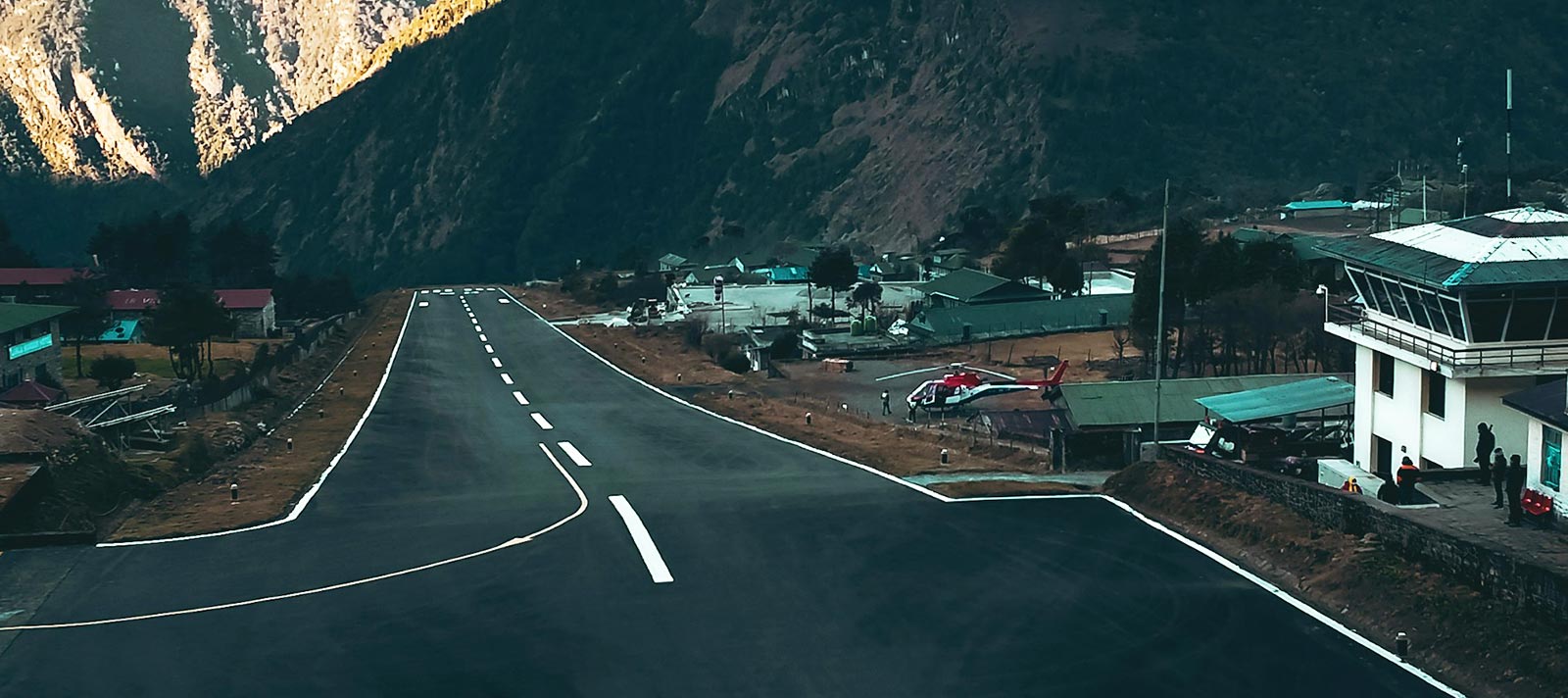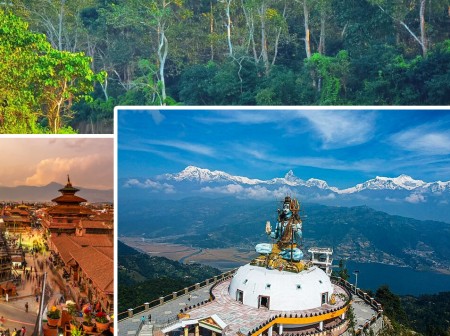
Lukla Flight Guide for Everest Base Camp Trekkers
- soleencounters
Flying into Lukla Airport is not just the start of your Everest Base Camp Trek—it’s an adventure in itself. Officially named Tenzing-Hillary Airport, Lukla is known for its short runway perched on a Himalayan cliff edge, making it one of the most thrilling and scenic flights in the world.
Table of Contents
For many trekkers, this flight is their first real taste of the Everest region. But while it’s breathtaking, it can also be unpredictable. From early morning departures to sudden weather delays, understanding what to expect on your Lukla flight is key to starting your trek stress-free.
In this guide by Sole Encounters Trekking Pvt. Ltd., we’ll cover everything you need to know about the Lukla flight experience, including airports, weather, safety, delays, and local travel tips.
What Is Lukla Airport and Why Is It Famous?
Lukla Airport is the main gateway for trekkers heading to Everest Base Camp and the entire Khumbu region. Located at an altitude of 2,860 meters (9,383 ft), it serves as the launching point for the classic trek to base camp.
Key features of Lukla Airport:
-
One of the world's most challenging airports
-
A 527-meter (1,729 ft) runway with a steep incline
-
Positioned between mountain ridges and cliffs
-
Flights usually operate in the early morning, when weather is clearest
Despite its reputation, thousands of successful landings happen here annually—especially when flown by experienced local pilots.
Where Do Lukla Flights Depart From?
While most travelers previously flew Kathmandu to Lukla, in recent years (especially since 2019), most flights have been rerouted to depart from Ramechhap Airport due to congestion at Kathmandu Airport.
Two main departure options:
-
Ramechhap (Manthali) to Lukla
-
Distance from Kathmandu: ~132 km (4–5 hours drive)
-
Shorter flight (15–20 minutes)
-
Less weather disruption than Kathmandu
-
-
Kathmandu to Lukla (limited flights)
-
Only available during off-peak seasons or for helicopter/private charters
-
For the latest logistics and trip start points, check our Everest Base Camp Trek page.
When Is the Best Time to Fly to Lukla?
Since Lukla is weather-dependent, timing matters. The best seasons for flights are:
-
Spring (March to May): Clear skies, stable flying conditions
-
Autumn (late September to November): Ideal for visibility and low wind
-
Winter (December to February): Fewer crowds but colder and sometimes foggy
-
Monsoon (June to August): Frequent cancellations due to cloud cover and rain
Tip: Book flights early in the morning (6:00–9:00 AM) to maximize your chance of flying before clouds build up.
What to Expect on the Flight
Here’s what you can expect before, during, and after your Lukla flight:
Before the Flight:
-
Check-in early—you may need to reach Ramechhap by 3–4 AM for early departures.
-
Luggage weight limits apply: Usually 10 kg for checked bags and 5 kg for hand carry.
-
Flights are weather-permitting—even on the day of, flights can be delayed or cancelled.
During the Flight:
-
Small 16–18 seat Twin Otter aircraft
-
Open cockpit view (often)
-
Stunning aerial views of terraced fields, river valleys, and Himalayan peaks
-
Slight turbulence and sharp descents are normal
Upon Arrival at Lukla:
-
Land on a sloped runway that ends at a stone wall
-
Collect baggage immediately and begin the trek from Lukla (2,860m) to Phakding (2,610m)
How Safe Are Lukla Flights?
Although Lukla has a reputation for being "dangerous," it’s worth noting:
-
All flights are operated by trained Nepali pilots with extensive mountain flying experience.
-
Airlines fly only in clear weather, often delaying or cancelling for safety.
-
Lukla has modern control systems and strict aviation rules enforced by Nepal’s Civil Aviation Authority.
In recent years, the accident rate has declined, and most disruptions are due to weather—not mechanical or pilot error.
Looking for expert support from arrival to summit? Our Everest Region Treks are fully guided and logistically optimized.
Helicopter Alternatives to Lukla
If your flight is cancelled or you're looking for a premium option, helicopters offer a flexible alternative.
Benefits of helicopters:
-
Fly even in marginal weather
-
Depart directly from Kathmandu (no long drive to Ramechhap)
-
Great for small groups or tight schedules
However, the cost is significantly higher—starting from USD 450–600 per person, depending on group size.
Tips to Handle Delays or Cancellations
Delays are common, especially during monsoon and winter. Here’s how to prepare:
-
Allow buffer days before and after your trek
-
Keep your Everest Base Camp Trek itinerary flexible
-
Have a travel insurance policy that covers flight cancellations and helicopter evacuation
-
Book with a company (like Sole Encounters) that has on-ground support and local connections
Read our Guide vs Solo Trekking to Everest Base Camp to learn how guided treks help in managing delays and uncertainty.
Travel Essentials for Lukla Flight
-
Earplugs for engine noise
-
Warm jacket for the cool morning air
-
Snacks and water
-
Travel sickness pills, if prone to motion sickness
-
Power bank, as charging may be limited in Lukla
Why Choose Sole Encounters Trekking for Your Lukla Flight?
At Sole Encounters, we understand the unpredictability of Himalayan travel. That’s why we:
-
Book early morning flights with reliable operators
-
Provide airport transfers to Ramechhap or Kathmandu
-
Monitor weather and arrange alternative plans if needed
-
Have 24/7 emergency support
-
Offer seamless transitions from Lukla to your first trekking lodge
Whether you're planning your first EBC trek or returning for a second Himalayan journey, our team ensures your Lukla flight experience is smooth and safe.
Conclusion: Fly Prepared, Trek Confident
The flight to Lukla is an unforgettable part of the Everest Base Camp Trek—a breathtaking window into Nepal’s raw mountain beauty. But it also demands flexibility, awareness, and expert planning.
With Sole Encounters Trekking, you gain the peace of mind of flying with a company that knows the terrain, weather, and people of the Khumbu region intimately.
✅ Explore our Everest Base Camp Trek
📞 Talk to our Experts
📩 Still have questions? Contact Us
Recent Posts
.jpg)
3rd Jul, 2025
.jpg)
4th Jul, 2025
.jpg)
4th Jul, 2025
.jpg)
7th Jul, 2025
.jpg)
8th Jul, 2025
.jpg)
8th Jul, 2025
.jpg)
8th Jul, 2025

10th Jul, 2025








